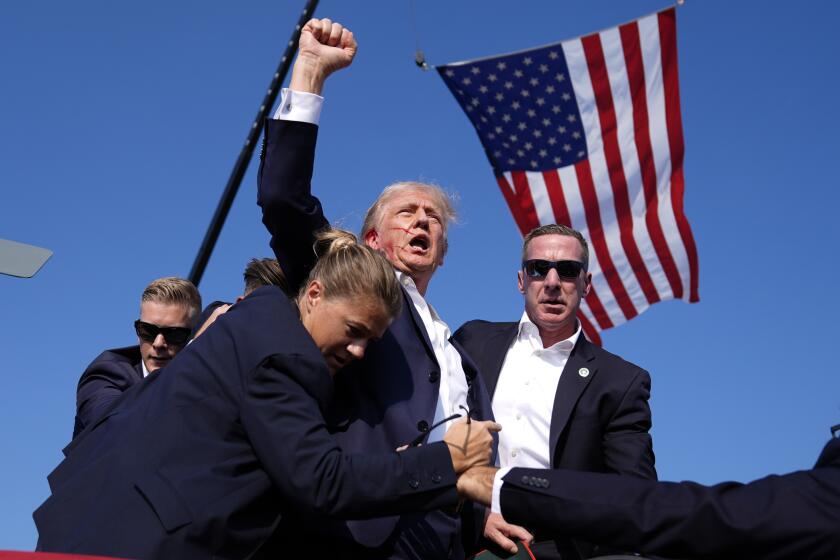Lonely Victory for U.S. Navy Lawyer
The U.S. Navy lawyer who challenged the Bush administration’s efforts to try terrorism suspects at Guantanamo Bay, Cuba, walked a professional tightrope between fellow officers trying to gain speedy convictions and what he considered a moral imperative to buck the chain of command and vigorously defend his client.
Lt. Cmdr. Charles Swift could have taken the easy route of arranging a plea bargain for Salim Ahmed Hamdan, the Yemeni alleged to have worked as a driver and bodyguard for Al Qaeda leader Osama bin Laden.
But fearful of the dangerous precedent that could be set by denying international standards of justice to those swept up in the war on terrorism, Swift battled to get the rights and protections of the Geneva Convention for his client.
The Supreme Court ruled Thursday that President Bush had overstepped his war powers in sending Hamdan and nine others to face military tribunals, America’s first since World War II.
“I feel like we all won, that the rule of law won, and that is essentially what we are all about,” Swift said of the high court’s validation of his three-year campaign on behalf of his 36-year-old client.
Swift was assigned to defend Hamdan by the Pentagon in November 2003 and initially was ordered by a superior officer to secure a plea bargain so there would be a timely conviction.
“I had the unenviable task of going down to this guy from Yemen in the uniform of people who had been treating him badly and saying, ‘If you don’t make a deal you may never see me again,’ ” Swift recalled of his first meeting at the U.S. detention facility at Guantanamo with Hamdan and his decision to fight a process stacked against the defendant.
Swift was allowed a rare phone call to the Guantanamo prison Thursday to give Hamdan the news of their legal victory. He described the prisoner as “humble, not jubilant, and very, very thankful.”
“It was gratifying to hear the belief in his voice, the recognition that mighty people don’t always get to do what they want,” Swift said of Hamdan, who, he added, understands that his case is far from over.
After more than 100 meetings at the remote U.S. naval base in southeastern Cuba, Swift said, he and Hamdan have developed a trusting relationship, and he would gladly represent the Yemeni in any future trial, military or civilian.
Colleagues attributed the high court ruling to what they considered to be Swift’s determination to protect the integrity of U.S. jurisprudence against a Pentagon bent on retribution for terrorism attacks on U.S. forces.
“It took exceptional courage. He had to risk himself being alienated from the larger military establishment,” said David Scheffer, law professor and director of the Center for International Human Rights at Northwestern University. “He must have known when he took this on that he was risking his career, and sadly he may have done that within the U.S. Navy.”
Though Swift’s successful challenge of the tribunal’s legitimacy will probably open doors in the private sector and academia for the Navy lawyer, Scheffer said, Swift has reportedly been passed over for promotion.
“It was a gutsy move, and he did it with complete dedication and devotion to the cause,” Benjamin Sharp of the Washington office of Perkins Coie said of Swift, with whom the Seattle-based law firm collaborated in Hamdan vs. Rumsfeld.
Sharp speculated that Swift’s military career was probably damaged by his defense of Hamdan, a possibility the naval lawyer also alluded to.
“I love the military. I love my career and I’m proud of it,” Swift said, noting he would be eligible for early retirement in nine months and would leave the Navy unless he was promoted. “One thing that has been a great revelation for me is that you may love the military, but it doesn’t necessarily love you.”
More to Read
Sign up for Essential California
The most important California stories and recommendations in your inbox every morning.
You may occasionally receive promotional content from the Los Angeles Times.










